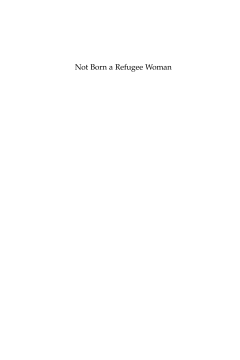
Additional Information
Book Details
Abstract
Not Born a Refugee Woman is an in-depth inquiry into the identity construction of refugee women. It challenges and rethinks current identity concepts, policies, and practices in the context of a globalizing environment, and in the increasingly racialized post-September 11th context, from the perspective of refugee women. This collection brings together scholar_practitioners from across a wide range of disciplines. The authors emphasize refugee women’s agency, resilience, and creativity, in the continuum of domestic, civil, and transnational violence and conflicts, whether in flight or in resettlement, during their uprooted journey and beyond. Through the analysis of local examples and international case studies, the authors critically examine gendered and interrelated factors such as location, humanitarian aid, race, cultural norms, and current psycho-social research that affect the identity and well being of refugee women. This volume is destined to a wide audience of scholars, students, policy makers, advocates, and service providers interested in new developments and critical practices in domains related to gender and forced migrations.
Helene Moussa has had extensive experience as an educator, researcher, and administrator, as well as in policy and organizational development, networking, and advocacy. Her last position before her retirement was with the World Council of Churches, Geneva, Switzerland as executive secretary for uprooted people with regional responsibilities with partners in the Middle East, Asia, and the Pacific.
Maroussia Hajdukowski-Ahmed is a Professor at McMaster University who teaches in the French Department, the Women’s Studies Program, and at the Institute on Globalization and the Human Condition. As a principal investigator of the McMaster Research Centre for the Promotion of Women’s Health, she conducted studies with immigrant and refugee women, co-authored Women’s Voices in Health Promotion and published essays on dialogism, participatory research, culture and mental health, and on exilic women’s narratives.
Nazilla Khanlou is Associate Professor at the LSB Faculty of Nursing and Department of Psychiatry, University of Toronto, and is the upcoming inaugural Ontario Women’s Health Council Chair in Women’s Mental Health Research at York University. She has received major peer-reviewed grants from federal and provincial research funding agencies, and conducted policy informing research (Status of Women Canada). She has published numerous articles, books, and reports on youth, immigrant health, and mental health promotion.
“…a compelling collection of testimonies, dialogues, research and experiences with displaced women in a diversity of locales and from a diversity of angles… This volume should stimulate research at the graduate level and also motivate further collaborative inter-disciplinary research to feed into policy analysis and policy making. Therefore, it will be of interest to a wide audience of scholars, students, policy makers, advocates and service providers interested in new developments and critical practices in a wide range of domains related to gender and forced migrations.” · Journal of Refugee Studies
“The book as a whole offers an array of difficult topics: the way women’s identities are shaped and reshaped by the complicated experiences of refugeeism; global sex trade and sex trafficking of Eastern European women; connections between war and homelessness…a valuable text that is bound to challenge students and teachers alike, in both our methodologies and our personal desires for an easy consumption of knowledge about the world and ourselves.” · Women's Review of Books
Table of Contents
| Section Title | Page | Action | Price |
|---|---|---|---|
| Title page-Not Born a Refugee Woman | i | ||
| Contents | v | ||
| Tables, maps, and illustrations | vii | ||
| Acknowledgements | ix | ||
| List of Abbreviations | xi | ||
| Introduction | 1 | ||
| Section I-Reconceptualizing Identities | 25 | ||
| Chapter 1-A dialogical approach to identity | 28 | ||
| Chapter 2-The gender relations of home, security, and transversal feminism | 55 | ||
| Chapter 3-Always 'Natasha' | 67 | ||
| Chapter 4-Reconstituting the subject | 83 | ||
| Section II-Challenging Methodologies Challening the Researcher | 97 | ||
| Chapter 5-Befriending refugee woman | 101 | ||
| Chapter 6-'Days you remember' | 113 | ||
| Chapter 7-War, diaspora, learning, and women's standpoint | 135 | ||
| Chapter 8-Being a writer on women, violence and war | 150 | ||
| Section III-Rethinking Practices creating spaces for agency | 163 | ||
| Chapter 9-The representation of refugee women in our research and practice | 166 | ||
| Chapter 10-Refugee youth, gender and identity | 173 | ||
| Chapter 11-Pray god and keep walking | 180 | ||
| Chapter 12-'We want to talk they give us pills' | 196 | ||
| Section IV-Reviewing Policies | 215 | ||
| Chapter 13-Protecting refugee women | 219 | ||
| Chapter 14-Social protection of refugee women | 228 | ||
| Chapter 15-The gender factor in refugee determination and the effect of 'gender guidelines' | 244 | ||
| Chapter 16-Pursuing National responsibility in a post-9/11 world | 254 | ||
| Notes on contributors | 263 | ||
| References | 270 | ||
| Index | 302 |
